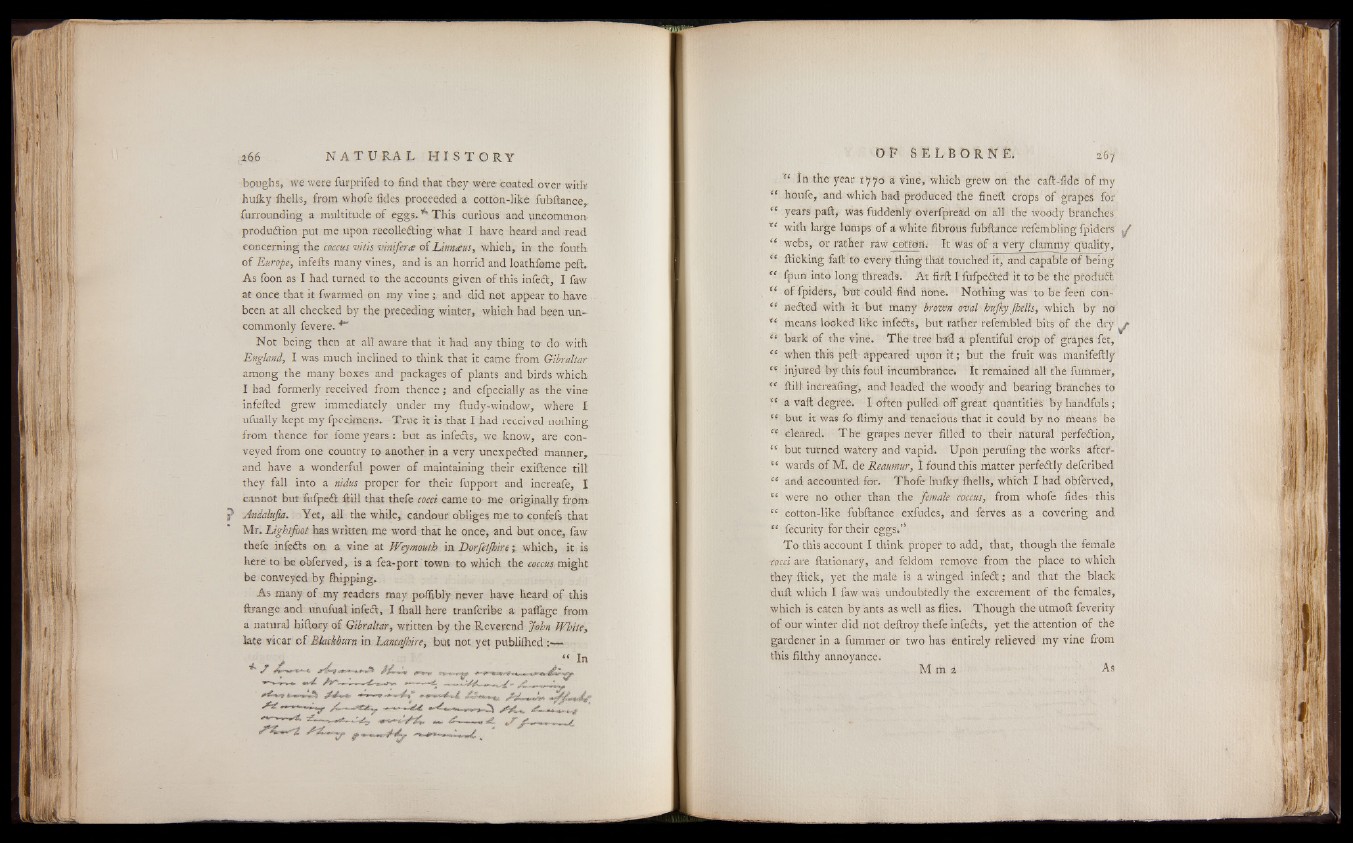
3.66 N A T U RA L H I S T O R Y
boughs, we were furprifed tg find that they were coated over with
huiky lhells, from whofe fide? proceeded a cotton-like fubftance,
furrounding a multitude of eggs. * This curious and uncommon-
production put me upon reeollefting what I have heard and read
concerning the coccus vitis vinifene of Linnaus, which, in the fouth
of Europe, infefts many vines, and is an horrid and loathfame peft.
As foon as I had turned to the accounts given of this infedt, I faw
at once that it fwarmed on my vine ; and did not appear to have
been at all checked by the preceding winter, which had been uncommonly
fevere.
Not being then at all aware that it had any thing to do with
England, I was much inclined to think that it came from Gibraltar
among the many boxes and packages of plants and birds which
I had formerly received from thence; and efpecially as the vine
infefted grew immediately under my ftudy-window, where I
ufually kept my fpecimens. True it is that I had received nothing
from thence for fome years : but as infedts, we know, are conveyed
from one country to another in a very unexpected manner,
and have a wonderful power of maintaining their exiftence till
they fall into a nidus proper for their fupport and inereafe, I
cannot but fufpedt ftill that thefe cocci came to- me originally from
p Anialufa. Yet, all the while, candour obliges me to confefs that
MuLighlfoot has written me word that he once, and but once, faw
thefe infedts on a vine at Weymouth, in Dorfetjhire; which, it is
here to be obferved, is a fea-port town to which the coccus might
be conveyed by fhipping.
As many of my readers may pofljbly never have heard of this
ftrange and unufuat infedt, I (hall here tranfcribe a pafiage from
a natural hiftoxy of Gibraltar, written by the Reverend John White,
late vicar c f Blackburn in Lcmcafhire, but not yet publiihed
In
+ -s
^ » '“"«"»P
**•' IMp' ■ ^■ **-*'* •*>!«! (.. J
‘V - - ----- I
O f S E L B Ö R N Ë . 267
. “ In the year 1770 a vine, which grew on the eaft-fide of tny
“ houfe, and which had produced the fineft crops of grapes for
“ years paft, was fuddenly overfpread on all the woody branches
tc with large lumps of a white fibrous fubftance réfembling fpiderâ ^
“ webs, or rather raw cotton.- It was of a very clammy quality,
“ flicking fall to every thing that touched it, and capable of being
“ fpun into long threads, At firft I fufpédtéd it to be the pfodudfc
“ of fpidéfs,- blit côüid find none. Nothing Was to be féefi con-
“ netted with it but many brown oval huffyJhells, which by no
tc means looked like infedts, but rather refertibled bits of the dry y
“ bark of the vine. The tree had à plentiful crop of grapes fet,
“ when this peft- appeared upon it ; but the fruit was manifeftly
injured by this foul incumbrance, It remained alt the fummer,
" ftill inérêâfing, and loaded the woody and bearing branches to
“ a vaft degree. I often pulled off great quantities by handfuls ;
“ but it was fo fli-my and tenacious that it Could by no means be
“ cleared. The grapes never filled to their natural perfection,
“ but turned watery and vapid, Üpöh perilling the works after-
tc wards of M. de Reaumur, I found this matter perfectly defcribed
“ and accounted for. Thofe huiky fhelis, which I had obferved,
t£ were no other than the female coccusy : from whofe fides this
“ cotton-like fubftance exfudes, and ferVes as a covering and
“ fecurity for their eggs-.’’
To this account I think proper to add, that, though the female
cocci are ftationary, and feldóm remove from the place to which
they flick, yet the male is a winged infedt ; and that the black
dull which I faw was undoubtedly the excrement of the females,
which is eaten by ants as well as flies. Though the utmoft feverity
Of our winter did not deftroy thefe infects, yet the attention of the
gardener in a fummer or two has entirely relieved my vine from
this filthy annoyance.